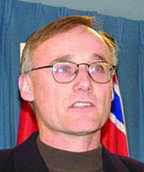Catholic Social Thought means dignity for all
...A Canadian response
By Joe Gunn
January/February 2010
Return to Table of Contents
Print Article
At least one in 10 Canadians currently lives in poverty. The current recession means that the most vulnerable (people with disabilities, Aboriginals, single parent families, newcomers) are now at even greater risk. Already, people working full-time at minimum wage are living in poverty (as measured by the low-income cut-off). The poor are the first to lose their jobs and find it harder to get new work. Social assistance and Employment Insurance are inadequate to keep people from a life of poverty. If the economy continues to slump, it is clear that the difficulties faced by poor Canadians will increase and more people will slide into poverty.
But this does not need to happen, according to Catholic Social Thought as well as those who support Dignity for All: The Campaign for a Poverty- Free Canada. The Canadian Catholic Bishops have said: “Poverty, which is a complex phenomenon and source of suffering, ultimately symbolizes marginalization…Material poverty is not necessarily a permanent situation, nor is it intrinsically negative. It is not a personal problem of certain ‘unworthy’ individuals. Poverty is sometimes caused by environmental factors or by private or public corruption. Poverty may also be the result of illness, disability or simply the lack of personal initiative. Most often, however, poverty is the result of economic processes created and directed by humans. Viewed in this light, poverty appears as a phenomenon that we can influence. We can change such processes by making different societal choices.” (The Struggle Against Poverty: A Sign of Hope in our World, October 1996)
The Dignity for All campaign is a made-in-Canada means of exemplifying what Catholic Social Thought calls “the preferential option for the poor.” Launched in May 2009 at the Canadian Social Forum in Calgary, the campaign has three goals:- A comprehensive, integrated federal plan for poverty elimination.
A Federal Act to eliminate poverty, promote social inclusion, and strengthen social security.
Sufficient federal revenue to invest in social security.
Seven Canadian provinces have either implemented or are developing poverty reduction strategies. So have many Canadian municipalities. Premier Dalton McGuinty of Ontario has said that provincial strategies will only be successful if the federal government supports them. Most recently, Manitoba’s strategy explicitly states that “the federal government must be a willing partner.” Yet, when the United Nations Human Rights Council asked Canada to develop a poverty reduction plan, the Harper government’s June 2009 response was that Canada will refuse to act, using the tired old argument that addressing poverty is the responsibility of other levels of government.
The federal government, with its particular policymaking, legislative, taxation, and redistributive powers, has an especially critical role in building a poverty-free and more socially secure Canada. As the Caledon Institute has stated, “We believe that the federal government has the dominant role to play in tackling reduction. It can reduce poverty, it does reduce poverty, and it should reduce poverty a lot more.”
For a country as rich as Canada, there is no excuse for growing disparity, for the continued need for food banks or for emergency homeless shelters. We have a responsibility to care for our neighbours and to build a society—and an economy— that promotes the common good. Canadians can build a social movement that demands action from their federal government (and engages other societal actors) to eradicate poverty by developing a plan, estab-lishing timetables and targets, and including the people most negatively affected in the design as well as the proposed solutions.
Canadians are asked to support Dignity for All by signing on at www.dignityforall.ca, circulating this web link to others, and proposing organizational support to your Christian community or other local groups. Poverty in Canada can be eliminated. Now is the time to build a movement that can make dignity for all a reality.
Joe Gunn (inset) is the Ottawa-based executive director of Citizens for Public Justice, www.cpj.ca, an ecumenical social advocacy organization that co-hosts the Dignity for All campaign.
Return to Table of Contents
Print Article
